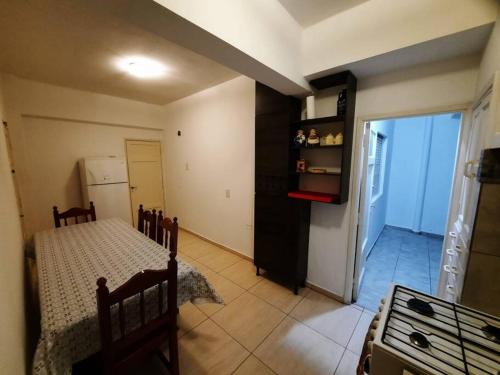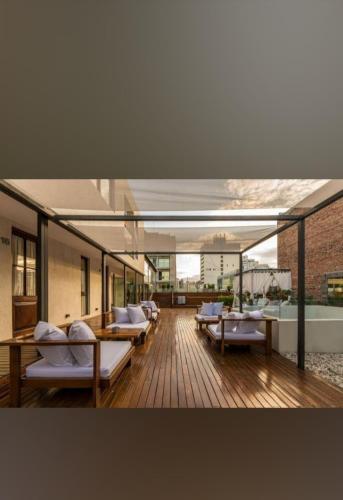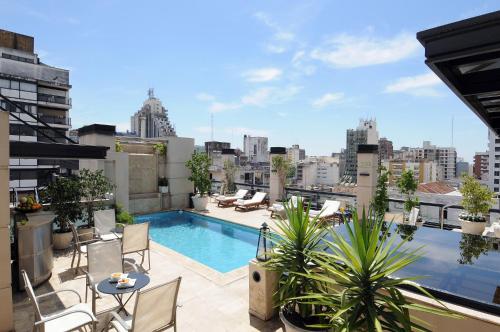Cordoba Jesuit Block, Argentina
It was only when I glanced down at the inscription that the thought came to me.
Had I been doing this subconsciously all along? And, if so, was this something I should be proud of and embrace?
I was standing in a courtyard of the Jesuit Block in Cordoba, Argentina’s second-largest city. The city itself is a thriving metropolis with a cultural and social scene reflective of the large number of universities it is home to.
But it’s also a city of history, having been founded more than 400 years ago as one of the first large Spanish colonies in this part of South America.
Around the older buildings of the colonial period, present-day Cordoba has grown. But it was in one of the original constructions of the seventeenth century that I had my realisation.
As I looked down at the inscription I noticed that this collection of buildings had been declared a World Heritage Site by UNESCO, the cultural arm of the United Nations.
This wasn’t the first time I had been to a UNESCO site, I was sure of that.
I had seen this sign before. And as I stood there and thought about it, I realised that I had probably been to dozens of these sites all around the world in my travels.
It stayed on my mind as I walked through the rest of the Jesuit Block and eavesdropped on a tour being given in broken English, picking up some interesting facts.
The designs on the walls were unique to this part of the world because of the way they fused together the Spanish view of Christianity with the connection to nature of the indigenous people.
The architect of the church was a boatbuilder by trade and so the ceiling of the building resembled the hull of a ship.
The university’s collection of books includes a very rare complete bible from 1645 written in seven different languages.
As I listened I realised that this site represented a seminal time in the history of South America as European and native cultures were brought together. It’s not a topic I’ve ever had a huge interest in but the more I’ve seen in the continent, the more I have realised how important it is.
And it’s for that reason that this site was included as one of Argentina’s World Heritage Sites.
My UNESCO mission
At that moment I made a decision. I decided that if I was on a journey to learn more about the world then I should take some advice from an expert. And that expert was going to be UNESCO.
If it thinks a site is important enough to be included on its list, then it’s important enough for me to visit.
From this day on, I am going to set myself a challenge to visit as many of the sites on the list as possible – maybe even all of them one day.
As of today, there are 936 sites on the list. So it’s going to be a slow project.
But what better way to see the great cultural and natural locations of our planet, though?
THE BEST ACCOMMODATION IN CORDOBA
There are lots of places to stay in Cordoba but the best options tend to be in the blocks around the edge of the historic centre.
BACKPACKER

Comfortable beds, large bathrooms, and modern amenities make Aldea Hostel a great choice.
APARTMENT

Close to restaurants and landmarks, Hermoso Departamento Centrico has two bedrooms, giving you a bit more space.
BOUTIQUE

Along with a modern design, Azur Real Hotel Boutique & Spa boasts a rooftop pool and a fitness centre.
LUXURY

From the marble interiors to the heated pool, Windsor Hotel is full of luxurious touches.
That’s a great goal – I’m just writing a post now about visiting Viscri’s Fortified Church in Romania… now THAT was so impressive! Some scoff at the UNESCO list, but I think it’s wonderful. It gives great guidelines to see as many beautiful and historic places as possible. Good luck, looking forward to the posts about it!
Exactly – it’s all about a framework to explore places you may not have gone otherwise. I’d love to get to Romania soon. it looks like a beautiful place! Can’t wait to see your pictures from there.
Hmmm interesting. I never though about just how many World Heritage Sites there are. I might have to see how many I can check off that list… Good idea!
Let me know how you go. I was surprised by how few I had been to, to be honest. Even in countries I had spent a lot of time in, I seemed to have missed quite a lot because I wasn’t actively looking out for them. That’s all about to change now!! 🙂
I make a point of seeing the World Heritage sites, when I’m in the general area. It has always been worth any extra effort. Good luck 🙂
Thanks for the encouragement – I’m going to need all the luck I can get to do this! And you’re right, it’s often definitely worth the effort!!
A lofty goal. Good luck to you. I have no desire to do the same 🙂
Ha ha. Thanks for the support! 🙂 You’re welcome to join me if you ever change your mind…
Wow! What a great goal to have to learn the history of the world! There’s so much, it’s incredible!
Cordoba looks so lovely, I’m inspired to visit now. The cathedral’s architecture is so unique! Thanks for the wonderful post!
-Molly
Thanks. I don’t actually think I’ll get to the majority of them all anytime soon. But it is a great way to learn more about the world. And already it’s taken me to some fascinating places that I wouldn’t have visited otherwise.
I try and visit as many UNESCO World Heritage Sites as well and I’m usually not disappointed. I just came back from Barcelona which has a whopping 9 sites.
Oh, I can’t wait to get to Barcelona. Spain has the second-highest number of sites in the world, so that’ll help me cross a few off the list.
Thats a great mission! Good luck!
Thanks! Let’s see how it goes… (will you forgive me if I give up i a few months?)
Good luck with your new mission. It’s exciting to have a goal to try to reach. I love the idea!
Thanks Deb. I probably should have come up with a more attainable goal (something easier than 936 sites scattered across the whole globe… and growing). But it’s nice to have a bit of a mission when you’re just wandering aimlessly 🙂
I had a very, very similar realisation and am now in Cordoba to see this today – It will be my 230th site! I agree on the needing expert advice and they havn’t lead me astray so far!